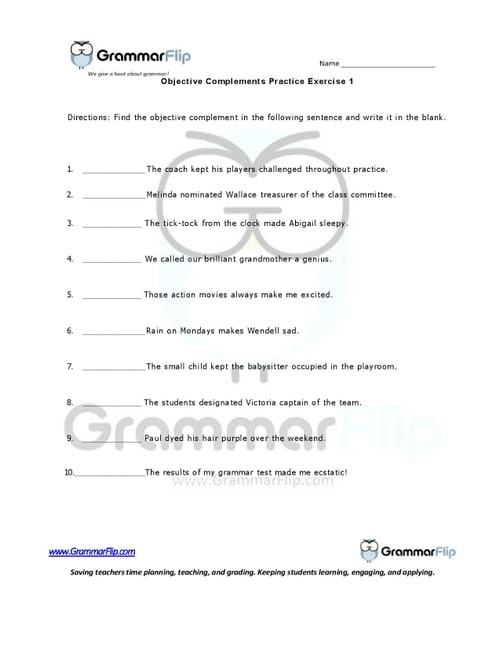What is an Objective Complement?
An objective complement (or object complement) is a word or phrase that follows a direct object and describes or renames it.
Examples of Objective Complements
Some examples of objective complements would be the following:
Public speaking makes Henry nervous. (“Henry” = direct object; “nervous” = objective complement)
Boring movies make me sleepy. (“me” = direct object; “sleepy” = objective complement)
Jane painted her nails red. (“nails” = direct object; “red” = objective complement)
The students elected Gus secretary of the debate club. (“Gus” = direct object; “secretary” = objective complement)
What to Know About Objective Complements
Objective complements can add a variety of depth and detail in your writing primarily by how they further describe or modify the direct object. Objective complements appear directly after the direct object and in the following order:
Verb | Direct Object | Objective Complement
They deemed the attempt a failure.
(verb = deemed, direct object = attempt, objective complement = failure)
Notice how the word “failure” further describes the direct object “attempt.” It provides additional information regarding the attempt.
Be sure to use objective complements where you can in your writing to add depth and detail, and be sure not to confuse them with indirect objects which are very different.
Download a Free Worksheet on Objective Complements!
Click the image below to download your free worksheet on objective complements!

How well do your students understand objective complements?
Explore More GrammarFlip Lessons!
Parts of Speech lessons provide the building blocks of grammar. GrammarFlip covers these topics in detail to ensure a solid foundation is built. First time learners and students seeking to review the parts of speech can both benefit from the instructional videos and slide show reviews.
Parts of the Sentence lessons are critical for understanding how the parts of speech function in language construction. From the basic to the advanced, these lessons will cover a wide range of grammar topics that can be used in any grade level or classroom.
Mechanics and Usage lessons equip students with the necessary skills to communicate clearly to all audiences. With a focus on the application of these concepts in student writing, these lessons tie together both simple constructions of grammar as well as the more complex such that any age or skill level of student will benefit.

